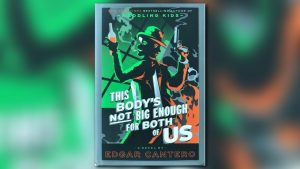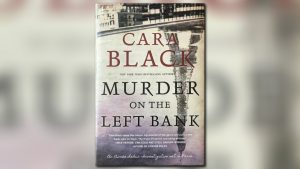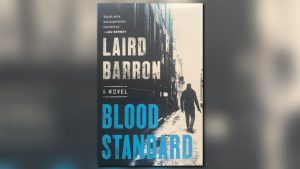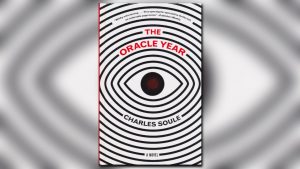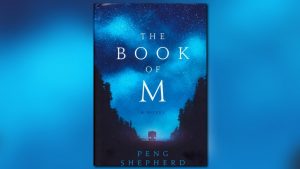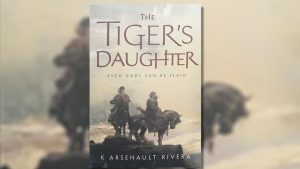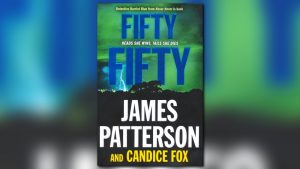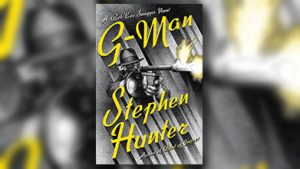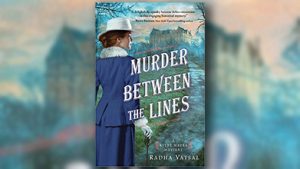Jack Gantos’s “From Norvelt to Nowhere” is the follow-up to “Dead End in Norvelt,” a Newbery Medal novel.
Taking place in the shadow of the Cuban missile crisis, young Jack Gantos is fighting off other kinds of trouble that are raining down on his utopian town of Norvelt.
“From Norvelt to Nowhere” takes the reader through a wild road about roots and revenge, a last change of love, and the power of friendship.
Twelve-year-old Jack finds himself on missions that takes his mentor, Miss Volker, and himself hundreds of miles away on the pursuit of the oddest outlaws after the passing of the town’s founder, a new crime by an old murderer, and an explosion.
VOICEOVER: Books & Co. is made possible by the Virginia G. Piper Center for Creative Writing, serving writers and readers in the Phoenix metropolitan area, the state of Arizona, and the world.
ALBERTO RIOS: Welcome to Books & Co. Bienvenidos, todos. I'm your host Alberto Rios, and we're joined today by Jack Gantos who will be talking about his most recent book, "From Norvelt to Nowhere." Welcome, Jack.
JACK GANTOS: Thank you very much for having me on the show.
ALBERTO RIOS: This is going to be a lot of fun, I can tell.
JACK GANTOS: Thank you.
ALBERTO RIOS: There's a Jack Gantos character in the book. Let's start there.
JACK GANTOS: Hmmm.
ALBERTO RIOS: Is Jack Gantos any relation to Jack Gantos?
JACK GANTOS: Yes. I'm sort of the overdubbed version of my younger self in the book. When I was writing it, because Norvelt is a real town in Western Pennsylvania, I started writing and then I had of course a fake name. Then I thought, this is my town, my family, these are my relatives. Why not throw myself in there? So I did. I think it turned out nicely.
ALBERTO RIOS: The theater of the self.
JACK GANTOS: I think so, I like that. I wrote another book before, one of the Jack Henry books, and used Jack Henry instead of Jack Gantos. And now I really regret it.
ALBERTO RIOS: Maybe it's not too late.
JACK GANTOS: Perhaps.
ALBERTO RIOS: This book, "From Norvelt to Nowhere," is a sequel.
JACK GANTOS: Yes.
ALBERTO RIOS: Without talking perhaps about the first book, what is the work of a sequel? How do you make it stand on its own feet? How did you conceive of that?
JACK GANTOS: That's a very big question. It actually becomes a difficulty and in this particular case kind of a bit of a double difficulty because the first book came out and won the Newbery Award and the Scott O'Dell Award. I'm up against the gold standard to myself and the sequel, how do you top that? You really are trying to pull a rabbit out of the hat. In another sense, you fall back really on tried and true smart ways to write. You look at your characters and look at the arc, what does each character need for their change, and what is the theme? How can you theme really line in there with the characters. When I was working on the sequel I was trying not to be overshadowed by the first novel but really trying to do good novel work on the second one.
ALBERTO RIOS: I think that comes through in quirky ways. It didn't feel like there was an uber-controller. The characters got to tell what you they wanted and they got to get hungry and stop here and do this and think that. I think that was both eclectic and a lot of fun for the reader.
JACK GANTOS: Well, yes. And also, you know, it's almost like a buddy book in a certain way. It's a road trip buddy book between an 11-year-old boy and an 85-year-old lady.
ALBERTO RIOS: An unlikely duo, but ultimately a very loving and surprisingly adventurous one.
JACK GANTOS: Yes.
ALBERTO RIOS: Was it Harold and Maude that had a pairing like that?
JACK GANTOS: The words were just on my lips when you mentioned it. Yes, it has been mentioned but I loved that movie. In Boston when I was a student there in the 70s, Herald and Maude was the midnight show all the time. It was only knocked off by the Rocky Horror Picture Show.
ALBERTO RIOS: You have the town of Norvelt and an obsession with Eleanor Roosevelt.
JACK GANTOS: Yes.
ALBERTO RIOS: Can you talk about that a little bit?
JACK GANTOS: Oh, sure, any chance I get, I love Eleanor Roosevelt, I like to champion her.
JACK GANTOS: When FDR came in the early 30s, Eleanor Roosevelt looked out on 29% unemployment. That was really harsh. That's shocking. My grandfather was a miner, when the mines closed, the town closes, everybody's out of work. Eleanor Roosevelt started to help get the government involved in building small communities, Helping Hands communities. Norvelt in this particular case, the government bought a Hearst farm, designed these little Cape Cod homes, people applied, got in, they had a community farm, factory, they all helped each other. Eleanor Roosevelt really gave people dignity and we always remember that.
ALBERTO RIOS: I did not know that. I was glad to come to it through literature and know it for fact. I think that's an extraordinary -- it's more than a helping hand. It's even probably more than dignity, it's giving people a future, right?
JACK GANTOS: Yes. When I look back at photographs of my grandfather when I was -- Jack is 11, 12 in these Norvelt books. I have pictures of my grandfather in the mine working as a job. Look at this 50-year arc. If that town had not come around with that school, I would have been picking coal off the slag heap.
ALBERTO RIOS: Eleanor, that's where they got the name in a big contest.
JACK GANTOS: It was a good contest. The only African-American family in Norvelt submitted it and she won it. It was a really proud moment for her and her family, which was great. The other surprising thing, those are homestead towns and one of them is right downtown in Phoenix. It's right around where the museum is. Architects were allowed to build the houses to fit the environment. It was a little adobe community the government had sponsored. It's been sort of subsumed by the growth.
ALBERTO RIOS: Did it have a name, do you remember?
JACK GANTOS: I don't recall it having a Roosevelt name.
ALBERTO RIOS: Our viewers will no doubt be telling us.
JACK GANTOS: They probably know something. I drove in here on Roosevelt Way and I was like, yes!
ALBERTO RIOS: It's a lot more than with Eleanor Roosevelt, it's history itself, a big part of the plot. It's hard to know whether historical asides -- they are not asides, they are centrals. I don't know how you reconcile that when you think about it as a writer. But can you blend together these historical almost mini-lessons with plot action, adventure and forward movement in a book? I mean, you do it, just curious about your thoughts about it.
JACK GANTOS: You have to really parse all of those pieces, you can do it, in a timing sort of way so the one does not usurp the other or become more important. When I first started doing it in "Dead End in Norvelt," I first started having --
ALBERTO RIOS: The first book in this sequence.
JACK GANTOS: Yes.
ALBERTO RIOS: Okay.
JACK GANTOS: So when people would die, Miss Volker, she was hired to be the town nurse. She wrote everybody's obituaries when they would die. She was like an old IWW wobbly. She would then tack on a this day in history moment that was like an essay on that day in history to kind of educate the town and connect those people who died with the significance of history. And give people this great sense of depth in the world in which they lived.
ALBERTO RIOS: This is a great conceptualization.
ALBERTO RIOS: Did it come from something that happened as you were growing up?
JACK GANTOS: Well, she did.
ALBERTO RIOS: There's a literal Miss Volker?
JACK GANTOS: Yes.
ALBERTO RIOS: Okay!
JACK GANTOS: My mother used to loan me to her.
ALBERTO RIOS: It's getting closer and closer to the plot of the book.
JACK GANTOS: She had very bad arthritis and she could no longer type. She had an old Royal typewriter. My mother would loan me to anybody. Go down there and type up those obituaries for her, and she would dictate these moments of history. She would just reel them right out.
ALBERTO RIOS: Authentic to her sensibility and knowledge.
ALBERTO RIOS: Very impressive.
JACK GANTOS: Yes.
ALBERTO RIOS: Had to be impressive to you.
JACK GANTOS: I was really taken with it. She was the only person I actually knew at that time that could have that kind of dimensional thinking. She could talk about the past, present and future. She would say, well, look at yourself. You've got a past, a present and you'll know where you're going in the future. If you know your history you'll know what you're doing.
JACK GANTOS: She would be beating me with that, just making a case for that. That's really spot on.
ALBERTO RIOS: It's great that you would think about these things. I think so many kids, it sort of goes over the heads. You were in the middle of it.
JACK GANTOS: But we also lived in interesting times. It's like in 1962 when I'm writing that book, the Cuban missile crisis, we have so much going on. I think that was really brought into the house. We were digging a bomb shelter.
ALBERTO RIOS: And that's a very funny part of the novel, as well. We won't give that away. Bomb shelters were a big deal.
JACK GANTOS: Yes.
ALBERTO RIOS: What I'm curious about, what I love of course is this is for contemporary readers, young adults. We'll talk about that in a minute. But you're talking about another time. That's got to be a risk that you're not talking about hip-hop or things going on right now. You're talking about a very important time for adults. Does that become a very important time for young adults? I know we need to know our history but I'm curious as writer how that played for you.
JACK GANTOS: I think the connection, and I'm very aware of that connection. You don't want to drift in time historically. So far away from your contemporary readership that you're sort of fusty and off in the shadows and you seem insignificant. One of the things that will work to the positive is that even if you've moved off in history, the emotions of the characters are still authentic, and the emotions of an 11-year-old boy in 1962, are still the emotions of an 11-year-old boy in 2013. You make sure that the human qualities really carry over very strongly, and that's the linkage that you always have within the human being itself.
ALBERTO RIOS: That's well said.
ALBERTO RIOS: One of the things I appreciated -- and I think we forget or we're not registering it now -- is the absence of technologies like cell phones. So that for you, the writer, for plotting purposes, everything doesn't get revealed right in that instant. You don't just call somebody and tell them what's going on, you have to wait.
JACK GANTOS: I know.
ALBERTO RIOS: That's kind of delicious.
JACK GANTOS: It was so wonderful. It was It's so good if you're building a plot because you can let things simmer on the back burner. Like you say, with the cell phone you call up three or four people and say, what happened? And then you're up to date and the cat's out of bag, no plot.
JACK GANTOS: No plot at all, just experience.
ALBERTO RIOS: I'd like to take a moment to remind our viewers that you're watching Books & Co. I'm your host Alberto Rios. We're joined by Jack Gantos talking about his latest book, "From Norvelt to Nowhere." I want to ask you now about the historical asides. You have a great number of them. We've brought them up. I'm assuming they are all accurate.
JACK GANTOS: Yes.
ALBERTO RIOS: But I get lulled as a reader, if I know a few of them are history as I know it, I just believe you.
ALBERTO RIOS: You've got me where you want me.
JACK GANTOS: I do, it's very interesting. When I write the book, you know, and hear you are, you're working some fiction, a really nice --
ALBERTO RIOS: And this is a book of fiction, right?
JACK GANTOS: The foundation is real but then the icing is really swirly and thick. The history has to be genuine.
ALBERTO RIOS: Thick, delicious.
JACK GANTOS: I love that, terrific. When you're talking about Alex Decker Bergman or Emma Goldman, you have to have the facts. When you're talking about Bonnie and Clyde, you need to have the facts. With Eleanor Roosevelt, you can't go around turning her into being places where she wasn't. History is well documented.
ALBERTO RIOS: You have the opportunity to bring up some moments from that time that are worthy of remembering. Not just plot devices. The Marian Anderson story, which maybe you could remind us.
JACK GANTOS: Well, in "From Norvelt to Nowhere --"
ALBERTO RIOS: I bring it up because you were saying it was an African-American family who named the town.
JACK GANTOS: Tied in very, very strongly.
JACK GANTOS: When I was at the Lincoln memorial with Miss Volker and she was talking, she was just so angry, the Daughters of the American Revolution, the DAR at Constitution Hall had denied Marion Anderson the opportunity to sing there. As a result, Eleanor Roosevelt through the back door, the best way to approach things elegantly, arranged for Marion Anderson to sing at the Lincoln Memorial. It turned out to be one of America's magnificent moments, a thing of beauty. It had more power and more potential to move mountains than ever she would have had in Constitution Hall where it would have been just regular.
ALBERTO RIOS: It becomes a great American moment, as you say.
JACK GANTOS: It is. And now when you stand at the Lincoln Memorial and thinking of the statues of Dr. Martin Luther King and Marion Anderson, there are so many great moments right there, it's the vortex of America.
ALBERTO RIOS: That's a very kind of performative moment in history that you talk about here. You also talk about some process oriented things I found really wonderful. The Thomas Jefferson Bibles, for example. Do you want to tell us about that?
ALBERTO RIOS: I knew just in passing, it was just great to be reminded about the simplicity of that all over again.
JACK GANTOS: Thomas Jefferson is so central to Norvelt, it was designed on the Jeffersonian principal that America should be agrarian. Every house should have enough land to grow crops, in case of a downturn they could feed their family. That was a Jeffersonian principle. He secretly made his own Bible. He took a Greek, a Latin, a French and an English Bible, he could read all those languages. He cut out only the parts where Jesus said something. Not the apostles but what Jesus said. He made his entire Bible out of that. Then when he read it he realized, the message is all about love, understanding. And it's the gentlest Bible, a wonderful Bible. But he had to keep it secret politically because, you know, religiously it could have been quite inflammatory for him.
ALBERTO RIOS: Such a striking story.
ALBERTO RIOS: And so simple.
JACK GANTOS: I love it. You can see it over at the Smithsonian.
ALBERTO RIOS: You have a wonderful take on kid-think also, in that everybody's telling poor little Jack Gantos, you should read the book!
ALBERTO RIOS: But he's always reading the Classics Illustrated version of the book. I used to do that. I love that connection. How are you connected to Classics Illustrated? Especially that you have a lot of discourse on Jekyl and Hyde, for example.
JACK GANTOS: First of for the Classics Illustrated, I mean I don't know how a kid my age were probably from the same generation, for 15 cents you could get a really garish looking cover, Dr. Jekyl and Mr. Hyde, a lime green shadowy figure. And in all the classics I have two copies, two different Moby Dicks, all of Dostoyevsky's work, Crime and Punishment is great, The Fall of Pompeii, you know, all of that stuff, I still have a big, big stack of them. Poes, I had all of my Poes. The general thinking from a parent's point of view, oh, my God, this is the trashy version of the classics. And then when classic novels came out, again, I was like, whoa! This is wonderful! The classics are back, better than ever.
ALBERTO RIOS: It’s just how I felt about it. I thought, we've been here! We've been here!
JACK GANTOS: We're old-timers!
ALBERTO RIOS: And Classics Illustrated, you had maybe 20 pages or whatever it was, this big tome that weighed how many pounds. You took it with you, it was very much kind of the computer, iPad before its time. And it gave you access to so much more literature than you could possibly have taken in.
JACK GANTOS: So much more. And, you know, a couple of great things. It was sort of like the original Cliff Notes. But two, it was a teaser. I have my Moby Dicks, but I read it about every five years. I love that book. I remember reading the Classics version and thinking, this is great. Then when I really sort of grew up, well, I really want the rest of the meat on the bone for that book.
ALBERTO RIOS: I agree with you. I was led to a lot of books in exactly that same way. So I have a lot of respect for that.
ALBERTO RIOS: And we shouldn't forget Classics Illustrated, Junior, there were a lot of great things in there, too.
JACK GANTOS: Terrific stuff, just terrific. They had their place. You can still get them. They don't print them out anymore, but you can buy and trade them in comic bookstores.
ALBERTO RIOS: I check eBay, I've got a few bids out on some of my favorites. It's funny. The moments which you -- I suppose as an adult you remember as text passages are encoded with this kind of lively, sometimes garish, there's this illustration that does not go away.
JACK GANTOS: Oh, no.
ALBERTO RIOS: I have to say, I think you probably did the same thing, I didn't read it just once, a Classics Illustrated.
JACK GANTOS: Okay no, I had to hide them from my mother.
JACK GANTOS: They were kind of like bad.
ALBERTO RIOS: Of course, you should read the original but this is a bridgeway, too, likely. This is maybe a category called young adult literature. Could you talk about that? What makes it that? Why isn't it something else? What are the constraints and perhaps the freedoms that come with that?
JACK GANTOS: Well, when I started writing children's books the general sense was that any book with let's say a character in their teens, from 13 to 18, you know, would be sort of a young adult book and that would end up in the young adult collection as opposed to the middle grade readers or the picture book section. They separated that out. As they separated it out then it began to have its own life. There are great freedoms within there. Now you can have perhaps deeper internal passages, longer internal passages where you can say that young adult reader is going to stick with me. I can't have one or two or three sentences and quick get back to the action because that middle great reader is going to drift on me. More depth, tougher, more realistic situations. Now we see everything in terms of language and characters and whatever, functions, dysfunctions, Utopias, dystopias, it's all there, a real cave of literature.
ALBERTO RIOS: Almost adults becoming mature about young adults.
JACK GANTOS: Yeah.
ALBERTO RIOS: Trusting them and understanding they are capable of extraordinary thought. But it must be geared to them. So much literature maybe was not.
JACK GANTOS: I think so too, it was geared to him. The Outsiders, that was the first book I read where there were like teenaged kids talking like street talk, you know? And now when you read it it's like kittens compared to some of the stuff that's out there. Yes, now we're giving why. And the idea they can be big thinking and they can stretch out as characters.
ALBERTO RIOS: In that process, you're talking about maybe street talk or characters doing this, you do spend an occasional moment in quietude. You give us something that I have to say was quite elegant, the little moments. You have the great line about when they come into the library in Rugby and the Gantos boy says -- or a narrator or something, somewhere it surfaces that these books have been sleeping, but it's okay for books to sleep. That when you come upon them, it's like they wake up and nothing has gone. Nothing is gone from them, nothing is lost.
JACK GANTOS: Nothing is changed.
ALBERTO RIOS: You can't afford to do that a lot, but I think when you do it, you do it quite well in here.
JACK GANTOS: Sometimes you get an opportunity when you open paragraphs or close paragraphs, that you're just looking to go out on that one beautiful image note. You can go out softly, just like Bruckner, taking note and letting it go.
ALBERTO RIOS: Very nice, with that we will smoothly let this interview end. So I appreciate you for coming and spending some time with us.
JACK GANTOS: Thank you so much for the opportunity, such a pleasure.
ALBERTO RIOS: You've been watching Books & Co. I'm your host Alberto Rios. We've been joined by Jack Gantos talking about his latest book, "From Norvelt to Nowhere." Thank you for joining us, please come and visit us again when we'll be bringing you another good book. Thank you.
JACK GANTOS: Thank you.
VOICE OVER: "Books & Company" is made possible by the Virginia G. Piper Center for Creative Writing, serving writers and readers in the Phoenix metropolitan area, the state of Arizona, and the world.





